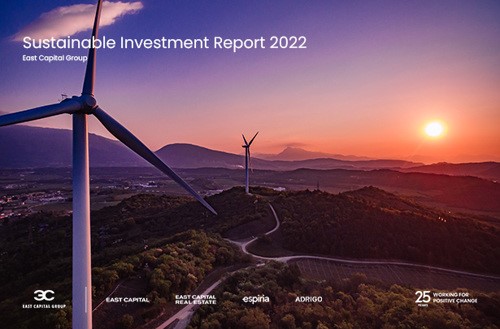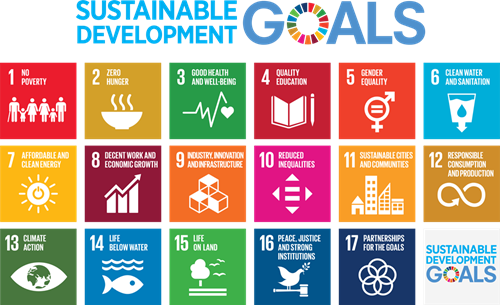Sustainability Related Information
Transparency of sustainability risk policies
According to Regulation (EU) 2019/2088 on sustainability-related disclosures in the financial sector (the SFDR), financial markets participants shall publish on their websites information about their policies on the integration of sustainability risks in their investment decision-making process.
East Capital Real Estate IV, managed by East Capital Real Estate, is classified as an Article 6 Fund under the SFDR, which means we integrate sustainability risks in the investment decision-making process. Environmental considerations, especially those enabling climate risk mitigation and adaptation, are the key priorities for us as investors and real estate managers. Environmental, social and governance (ESG) considerations play a significant part in the fundamental analysis process we use to generate superior risk-adjusted returns.
East Capital Real Estate is part of East Capital Group, and we use the Group’s ESG Framework for integrating sustainability risks. The Group’s ESG Framework consists of four pillars: 1. Sector Exclusions (Negative Screening), 2. Controversy (Norms-Based) Screening, 3. Proprietary ESG Analysis and 4. Active Ownership. The Group’s approach and the four pillars are in detail described in the East Capital Group webpage. East Capital Real Estate is applying the pillars as explained below:
Pillar 1: Sector Exclusions (Negative Screening)
East Capital Real Estate believes that integrating environmental, social, and corporate governance considerations into investment management processes and ownership practices positively impacts long-term financial performance. For this reason, we refrain from acquiring properties where the primary property use is in sectors, which we believe have negative environmental, social, or ethical implications.
East Capital Real Estate will not invest in commercial properties where the primary or significant use of the property is by tenants known to generate their revenues from manufacturing weapons, manufacturing tobacco, producing, selling, distributing, or marketing adult entertainment or gambling services and products.
Pillar 2: Controversy (norms-based) Analysis
Pillar 2 is about assessing companies in terms of compliance with international norms, standards and underlying conventions. The controversy analysis on transactions counterparties and tenants is conducted by the investment management team as well as external service providers.
Pillar 3: ESG scorecard and Red Flag analysis
East Capital Real Estate is conducting an ESG materiality assessment for our investments, including identifying material ESG risks and incorporating them into investment decisions.
The main tool used for assessing the sustainability profile of the potential new acquisitions is the proprietary ESG Scorecard. The ESG Scorecard structures our review of relevant and material ESG risks and opportunities, serves as a benchmark against peers or market average and as a tool to identify required improvements on an ongoing basis.
The ESG Scorecard is already used in the early investment screening phase, where it serves as a checklist of some key ESG considerations. It is then filled in with more information as the investment process develops. The final Scorecard Summary is presented to the Investment Committee as a part of the investment proposal. The Scorecard is thereafter reviewed and updated annually, and thus works as a mapping tool for continuous property improvement.
Upon new investments, the ESG Scorecard includes a Red Flag section with the 15 most critical ESG questions which outline the major risks related to the property’s sustainability profile and to the counterparty in the transaction. The Red Flag Analysis includes a review of any detrimental building materials and equipment, assessment of the key physical climate and transition risks related to the property, as well as potential controversies related to the Sustainable Development Goals, human and labour rights, and corporate governance image.
The properties are then assessed in various aspects of relevant sustainability issues – the ESG Scorecard incorporates 22 environmental, 14 social and 6 governance indicators. Emphasis is put on environmental issues such as energy management and efficiency, water consumption and recycling possibilities, and waste facilities. The Scorecard also covers accessibility, tenant wellbeing, health & safety, and key governance topics.
The Scorecard Analysis is concluded with a summary over key strenghts and weaknesses of the property, for which improvement actions and the related cost-benefit analysis are presented. The scorecard also generates an overall ESG score for the property. We would generally not invest in properties with a score below 60% and prefer that new acquisitions have scores in the upper range (80%-100%).
Pillar 4. Active property ownership
East Capital Real Estate shall act as an active, engaged, and responsible property owner and landlord. This includes close interaction with various stakeholders for improving the sustainability profile of the property and increasing awareness of sustainability in the real estate sector.
Transparency of adverse sustainability impacts
According to the SFDR, financial market participants shall also publish and maintain on their websites, where they consider principal adverse impacts (PAI) of investment decisions on sustainability factors, a statement on due diligence policies with respect to those impacts, taking due account of their size, the nature and scale of their activities and the types of financial products they make available.
East Capital Real Estate is a part of East Capital Group and does consider principal adverse impacts of investment decisions on sustainability factors.
In the investment analysis process, East Capital Real Estate conducts technical, legal, financial and tax due diligence of the property. The due diligence process serves as a tool to identify any adverse impacts of the investment decisions in relation to regulatory and compliance issues. The due diligence process ensures the investment process, and the transaction do not have any violations with regards to human rights, bribery and corruption, taxation, and fair competition; and ensures the compliance to UN Global Compact principles.
The investment team also considers the PAI indicators in the ESG Scorecard analysis, conducted prior to the investment. The Red Flag Analysis includes a review of any detrimental building materials and equipment, assessment of the key physical climate and transition risks related to the property, as well as potential controversies related to the Sustainable Development Goals, human and labour rights, and corporate governance image. The Red Flag Analysis for each building is reviewed by East Capital Real Estate’s ESG Steering Group and the potential PAI indicator outliers are identified and discussed. The ESG Scorecard also allows to consider the energy and water consumption intensity and waste management standards by providing information on the property’s energy rating, sustainability assessment, and past consumption data (if available).
Following the requirements of Regulation (EU) 2019/2088, and the information to be disclosed pursuant to Article 11(2) of that Regulation, the information on principal adverse impacts on sustainability factors will be published in the Annual Report referred to in Article 69 of Directive 2009/65/EC no later than within the appropriate time frame as required by the legislation.
As part of our sustainability work, East Capital Real Estate shall also ensure that the remuneration is consistent with the sustainability work undertaken by East Capital Real Estate and that sustainability aspects shall form part of the evaluation of the employees that serves as a basis for determining remuneration.
East Capital Real Estate, as part of East Capital Group, complies with a number of commitments, requirements and guidelines related to sustainability such as the UN PRI and UN Global Compact.


